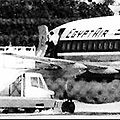This Day in History: November 24, 1985
Additional Date: November 24, 1985
The crisis began after gunmen took control of the passenger jet ten minutes after take off from Athens airport. The terrorists, calling themselves the Egypt Revolution, were heavily armed with guns and grenades. They forced the captain to divert to Malta, where the plane landed on a remote runway of Luqa Airport, near the capital, Valletta.
During the resulting stand-off the plane then sat on the runway for 24 hours while the Maltese authorities tried to negotiate the release of the hostages on board. The hijackers released some of the hostages soon after arriving, including two wounded stewardesses and some Filipino and Egyptian women.
But shortly afterwards they brought an Israeli woman to the doorway and, without warning, shot her in the head. A second woman was shot the following morning, and a third, also Israeli, later in the day.
Two more bodies - both killed on board the plane - were also pushed out onto the tarmac. Said one of the passengers, "They were constantly aggressive, waving guns and shouting in everyone's faces but all the passengers kept quiet, not daring to speak or move."
It later emerged that there were just three hijackers on board, two of whom died as commandoes stormed the plane. The storming of the aircraft killed 56 (out of the remaining 88 passengers) passengers, two crewmembers. Not surprisingly, there was strong criticism of the way force was used to end the hijacking. The commandoes were accused of poor preparation and heavy-handedness. Several of those passengers who died were killed not by the hijackers but by explosives set off by the Egyptian soldiers during the attack.
The five hostages killed by the hijackers, people - two Americans and three Israelis - shot in cold blood while the aircraft was on the tarmac in Malta, three survived.
The surviving hijacker was named as Omar Rezaq, a Palestinian who boarded the plane under a false identity. He was linked to the extremist Abu Nidal group.
He was tried in Malta and sentenced to 25 years in jail, though he served only seven. After his release, however, he went to Nigeria where the authorities handed him over to waiting FBI agents, who flew him to the United States to await trial. In 1996 he was sentenced to life imprisonment for air piracy.
Many questions were raised at way force was deployed to end the hijacking. Critics accused the commandoes of poor preparation and heavy-handedness. Several of those passengers who died were killed not by the hijackers but by explosives set off by the Egyptian soldiers during the attack.
